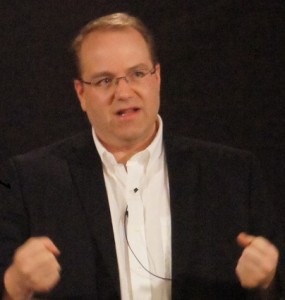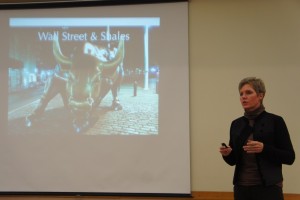 “Everything is F*cked “, Thomas Linzey remarked at the start of his talk – “it’s cooked from top to bottom.” Linzey, Executive Director of the Community Environmental Legal Defense Fund (CELDF), spoke to a crowd of about 100 people at the Lakewood Cultural Events Center on Saturday night.
“Everything is F*cked “, Thomas Linzey remarked at the start of his talk – “it’s cooked from top to bottom.” Linzey, Executive Director of the Community Environmental Legal Defense Fund (CELDF), spoke to a crowd of about 100 people at the Lakewood Cultural Events Center on Saturday night.
“It takes 5 minutes for a state to issue an [extraction] permit and 10 years for citizens to ‘burn’ it,” said Linzey, in describing the fight between the citizens of Nottingham, New Hampshire, and USA Springs Corp., which obtained a permit to build a 176,000-square-foot factory and extract over 300,000 gallons of water a day from the city’s aquifer. After 6 years of legal battles and more than $500,000, the residents fought their way to the New Hampshire Supreme Court, which sided with the corporation and ruled that the citizens of Nottingham had no legal standing to oppose the corporation’s “right” to extract water. The state of New Hampshire joined the suite – filing a brief in support of the corporation. The tide finally turned when CELDF helped the residents draft a local self-governance ordinance that asserted their right as a community to prohibit corporations from extracting water.
For the past several years, CELDF has been helping communities across the country draft similar ordinances. In 2013, CELDF worked with anti-fracking activists in Lafayette, CO, to draft a community rights city charter that bans all oil and gas activity in the city. In the November 2013 election, Lafayette residents passed the ban via a ballot initiative by 60-40 margin. Following the election, the oil and gas industry promptly sued the city and successfully overturned the ban in district court, where judge D.D. Mallard last week ruled that Lafayette residents do not “have the authority to prohibit what the state authorizes and permits.” The case has since been appealed and is working its way to the Colorado Supreme Court.
In his talk, Linzey described his initial experience as a lawyer defending communities from corporate extraction, when he realized the U.S. legal system was stacked against local government’s right to self governance. He discovered that existing laws prohibit communities from banning ‘legal uses’ – all of which are defined at the state level. So in mounting challenges to existing regulations, his defense of municipalities only “helped corporations draft better permits.”
Once Linzey recognized that the root of the problem was a lack of democracy, he shifted from fighting symptoms to tackling the structural foundation of U.S. laws. Linzey pointed out that corporations rely on governments to get power and rights, so “it’s your own government that’s the problem.” The law of preemption, which enables state governments to trump or ‘preempt’ local laws, “takes power from greater numbers of citizens and transfers it to a few people distant from the municipality.” To counter this rigged system, Linsey urges a “full scale revolt” among citizens that is “not championed by anyone important,” and challenges local governments to pass ordinances that elevate the rights of those communities over rights claimed by corporations.


 Legal council and organizers from the Colorado Community Rights Network
Legal council and organizers from the Colorado Community Rights Network
 The Air Quality Control Commission Public Comment Meeting is Wednesday, Feb 19 at 15151 East Alameda Parkway, Aurora, CO 80012 (Aurora’s City Center Building).
The Air Quality Control Commission Public Comment Meeting is Wednesday, Feb 19 at 15151 East Alameda Parkway, Aurora, CO 80012 (Aurora’s City Center Building).
 Please contact the Colorado Air Quality Control Commission (AQCC) commissioners to let them know that their constituents want to see air pollution curbed around oil and gas drilling. The more people they hear from the better, so if you have any friends interested in getting involved, please send forward this onto them.
Please contact the Colorado Air Quality Control Commission (AQCC) commissioners to let them know that their constituents want to see air pollution curbed around oil and gas drilling. The more people they hear from the better, so if you have any friends interested in getting involved, please send forward this onto them.